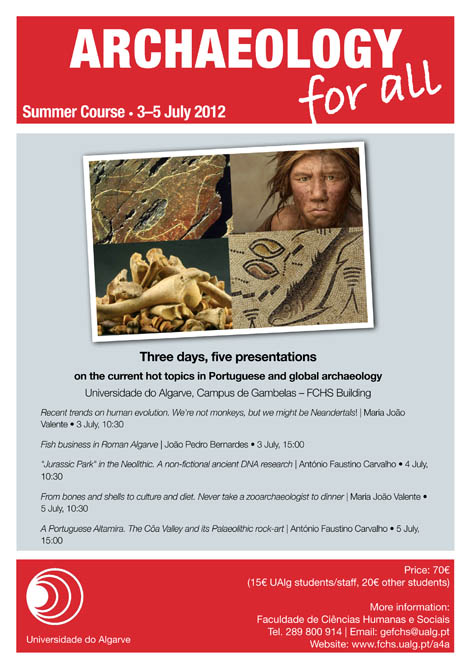 «Archeology for All/Archeology for All» is the name of the summer course that the University of Algarve organizes on its Campus de Gambelas (Faro) between 3 and 5 July.
«Archeology for All/Archeology for All» is the name of the summer course that the University of Algarve organizes on its Campus de Gambelas (Faro) between 3 and 5 July.
There will be three days with five presentations on the main current topics in Algarve and global archeology, under the coordination of Professor Maria João Valente.
The course is aimed at the general public and students, and will be entirely presented in English. “This edition, which we hope will be the first of many, will focus on some of the main current topics in Algarve and global archeology”, stresses the coordinator.
Thus, we will talk about «recent trends in human evolution, zoo-archaeological studies, the Roman fish trade in the Algarve, DNA analysis applied to Neolithic archeology and Paleolithic rock art».
In each presentation, the teachers – Maria João Valente, João Pedro Bernardes and António Faustino Carvalho – will use multimedia and supporting documentation (maps, illustrations and photographs) to explain the archaeological topics. Reference material will be provided, allowing participants to deepen their knowledge of the topic if they so wish.
Each presentation lasts two and a half hours. The course will take place at the University of Algarve's Gambelas Campus, in the FCHS building, room 2.35.
Registration costs 70 euros (price for the general public), 15 euros (for students and employees of the University of Algarve) and 20 euros for other students). The organization explains that a large part of these amounts will be used to pay for archeology books and other educational materials.
More information: Telephone 289 800 914, email: [email protected] or on the website of FCHS of the University of Algarve.
Program:
July 3rd, 10:30 am – 13:00 pm
Recent trends in human evolution. We're not monkeys, but we might be Neandertals!
Maria Joao Valente*
After decades of research and discussion, it seems that we might have been descendants of Neanderthals all along. We recently learned that our most ancient African ancestors are more numerous, intriguing and complex than originally thought. And that the oldest European humans were already experienced with crisis, facing extinction many times before success. These are a few of the recent trends in human evolution.
July 3rd, 15:00 am – 17:30 pm
Fish business in Roman Algarve
Joao Pedro Bernardes*
Fish “negotium” was one of the most important activities in the Algarve during Roman times (1st to 5th century AD). Fishery and fish transformation, which would be exported to the Roman world, is well attested in the archaeological record of the Algarve, through dozens of fishing sites along the coast. This presentation will mainly focus on the organization of these sites, the transformed products and their trade.
July 4th, 10:30 am – 13:00 pm
“Jurassic Park” in the Neolithic. A non-fiction ancient DNA research
Antonio Faustino Carvalho*
The famous 1993 film, “Jurassic Park”, centers on a fictional island where a billionaire philanthropist and a team of genetic scientists have cloned dinosaurs after recovering and deciphering their DNA. Less than 20 years later, the science fiction is real: it is now possible to recover and decipher DNA from ancient remains. This newly emerged science, “Palaeogenetics”, provides essential data on how agriculture, invented in the Near East ten thousand years ago, spread into Europe, and what kind of social and kinship relations were practiced by the early farming communities. Examples from the Near East, Germany and Portugal will be presented as case studies.
July 5th, 10:30 am – 13:00 pm
From bones and shells to culture and diet. Never take a zooarchaeologist to dinner
Maria Joao Valente*
What is a zooarchaeologist? What can we learn from old bones and shells? In this presentation we'll cover the major objectives of zooarchaeology, from general material identification to recording data on ancient diets and environments. And why a zooarchaeologist will always look different to a dinner plate.
July 5th, 15:00 am – 17:30 pm
The Portuguese Altamira. The Côa Valley and its Palaeolithic rock-art
Antonio Faustino Carvalho*
Questions of antiquity and authenticity were raised in the mid-19th century when the rock-art of the Spanish cave of Altamira was discovered. After decades of scientific debate, Palaeolithic rock-art and cave art were finally thought to be one and the same thing. One hundred years later, the accidental discovery of the Côa rock-art, in Portugal, also raised questions about its antiquity. Threatened by the building of a huge dam, this vast complex of open air rock-art was extensively studied and saved from destruction, and its Palaeolithic age was clearly demonstrated. The aim of this lecture is to present this remarkable archaeological heritage and its scientific importance.
(*) All the presenters are professors at the University of Algarve.

















Comments